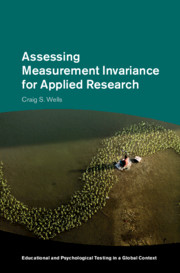Book contents
- Assessing Measurement Invariance for Applied Research
- Educational and Psychological Testing in a Global Context
- Assessing Measurement Invariance for Applied Research
- Copyright page
- Dedication
- Contents
- Figures
- Tables
- Preface
- Chapter 1 Introduction
- Chapter 2 Observed-Score Methods
- Chapter 3 Item Response Theory
- Chapter 4 Methods Based on Item Response Theory
- Chapter 5 Confirmatory Factor Analysis
- Chapter 6 Methods Based on Confirmatory Factor Analysis
- Appendix A A Brief R Tutorial
- References
- Author Index
- Subject Index
Chapter 5 - Confirmatory Factor Analysis
Published online by Cambridge University Press: 13 May 2021
- Assessing Measurement Invariance for Applied Research
- Educational and Psychological Testing in a Global Context
- Assessing Measurement Invariance for Applied Research
- Copyright page
- Dedication
- Contents
- Figures
- Tables
- Preface
- Chapter 1 Introduction
- Chapter 2 Observed-Score Methods
- Chapter 3 Item Response Theory
- Chapter 4 Methods Based on Item Response Theory
- Chapter 5 Confirmatory Factor Analysis
- Chapter 6 Methods Based on Confirmatory Factor Analysis
- Appendix A A Brief R Tutorial
- References
- Author Index
- Subject Index
Summary
Factor analysis, first developed over a century ago (Spearman 1904, 1927), attempts to explain the covariation and variance of a set of observed variables using a more parsimonious number of latent variables. Many observed variables in the social sciences, such as responses to items, are correlated. The correlation that these variables share can be explained using a theoretical latent variable, sometimes referred to as a factor. For example, suppose you develop a test comprised of constructed-response items purported to measure algebra skills. After you administer the test to a large sample of eighth graders, you notice that many of the items are correlated, indicating that students who have better algebra skills tended to score higher on each item compared to those who have lesser algebra skills. This correlation among the items is an indication that the items may be associated with a common latent variable represented by math proficiency in algebra. In other words, the observed variables, referred to as indicators, are correlated because they are influenced by a common factor, which is unobservable (such as math proficiency, anxiety). Factor analysis was developed to capture this common relationship shared among a set of observed variables.
- Type
- Chapter
- Information
- Assessing Measurement Invariance for Applied Research , pp. 245 - 294Publisher: Cambridge University PressPrint publication year: 2021
- 3
- Cited by

